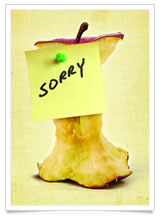by Rev. Daniel Gilbert

Is this a sin or not? Someone is selling marijuana, primarily to students at a local community college. It’s clearly a sin, right? But wait. She’s a young, widowed mother who needs money for her two kids. Still a sin? “Well, maybe that’s different,” some would say.
Is this a sin? A person who works in a police department’s homicide division is killing people during his time off. There’s no question: This one’s clearly a sin. But he only kills people who undeniably murdered others but were acquitted in the court system. Some would say, “Well, in that case, it’s probably a good thing and not a sin.”
Or what about this guy? He’s an adulterer, a murderer, a recognized mobster. He’s bad, right? “Oh, but he’s so likeable. Let’s give him a pass.”
All three of those examples are from current television shows, and they reflect a deep moral ambiguity in our current North American culture: “Well, it might seem wrong, but under the circumstances . . .”
There was a time when some things were generally considered sin in our culture: adultery and fornication, theft of even “small” things, illegal drug use, lying. Now, it’s true that our culture also had sins that were acceptable to many, such as imposed racial segregation, slavery with its brutality and taking land away from people who already lived there. (Getting a little too close, is it?) And then, of course, there’s that most-favored-of-all-churchmember sins: gossip. But more and more, nearly all things once considered sin are now excused on each person’s case-by-case basis.
Almost 40 years ago, famed psychiatrist Karl Menninger wrote a book entitled Whatever Became of Sin? Already in those days, he observed moral decay and warned against its impact. Things have not improved since then. We Christians are perhaps among those who decry it the loudest.

But what about the beams in our own eyes? Does the Third Commandment really mean it’s a sin to skip church some weeks when there’s really no valid reason to do so? (And no, a sporting event doesn’t count as valid.) What about an engaged couple going ahead with sex? “Well, they’re getting married, so it’s not really so bad,” we like to say, especially if they’re related to us. And it’s even more so if it’s you and your fiancé, right? As for the Eighth Commandment, that doesn’t really apply to those parking-lot discussions after school or church, does it? At least, not when it’s your circle of friends . . . unless they’re talking about you. Then it’s a sin for sure, right?
So, how do we determine if there are such things as sins and, if so, what those things are?
Written on the heart
Every culture throughout history has had moral restrictions. For example, it’s nearly universal in all societies that killing another human being without just cause and due process is wrong. That’s what God calls the Law written on the heart in Rom. 2:15. God built into every human being a limited knowledge of right and wrong, good and evil, sin and righteousness. It’s limited because sin twists and wrecks every human being. But even with that wrecked twistedness, some knowledge of right and wrong remains in the human heart, put there by God.
To get a clear, black-and-white list of what’s right and what’s wrong, however, we must look to what God reveals, namely, the written Law of God. To be sure, there are some gray areas: dancing or consuming alcohol, for example. There are some circumstances where something that in itself is not a sin might be because it would harm a weaker brother or sister. But there are some things that God clearly calls sin, no matter what the circumstances. Just take a look at the Ten Commandments for a compact list.
(Look at the explanations in Luther’s catechisms to get some good applications.)
Is it a sin to disobey the government except in cases where the government requires something contrary to God’s Word? Yes. “But what about . . .?” Forget it. We all do mental gymnastics about unfair laws and unique circumstances, but the Fourth Commandment (and Romans 13) is not rocket science: Obey the government unless it would clearly put you outside God’s revealed will. Otherwise, it’s sin.
Is it a sin to copy copyrighted material without legal permission? Yes. That’s called stealing, even when it’s a church using the material “for God’s glory.” Forget that too. In addition to breaking the Seventh Commandment, this is also breaking the Fourth Commandment. Sin.
Is it a sin to look at pornography, even the so-called light stuff or just once in a while? Yes. Is there any part of “Everyone who looks at a woman with lustful intent has already committed adultery with her in his heart” (Matt. 5:28) that’s too difficult to understand? It’s sin. Saying “I forgive that person” but then never wanting to see him or her again? Sin. Is that how you want God to forgive you? “I forgive you. Now go away forever.” Certainly not. Never wanting to see some-one again is hate, and “everyone who hates his brother is a murderer” (1 John 4:20). Sin.
What about unhealthy habits like smoking or habitual unhealthy eating? That’s shortening a God-given life. Any excuse? No, it’s sin. (Ouch!)
What is sex other than between one man and one woman who are married to each other? It’s sin. “One flesh” happens in a God-pleasing way only after one man and one woman leave father and mother (a public commitment) and “hold fast” to one another (a lifelong commitment). Anything else: sin.
What about an absence in your life of the fruits of the Spirit (Gal. 5:22–23)? Sin.

When you get down to it, every sin is breaking the First Commandment. It’s the original sin. What did the Tempter say to Eve? “You will be like God” (Gen. 3:5, emphasis added). That’s what the sinful nature in each one of us always wants: “I want to decide. I want to do what I want to do. I want God to love me and use all His power for my good, especially when I’m in trouble, but I want to call the shots.” That’s sin. The things listed above are simply manifestations of that original sin.
Guilty without excuse
How are you feeling about all this? Defensive? Probably. (I sure feel defensive. “Yes, but in my case . . .”) That’s because we’re sinners, and sinners always want to call the shots for themselves. Feeling guilty? I am. If God is right (and He is), then we’re both guilty and without excuse. Feeling afraid? There’s reason to: “The wages of sin is death” (Rom. 6:23).
Yes, there is such a thing as sin. Yes, anything God says is sin is sin. No exceptions. And yes, we’re judged and condemned for our sins. No, there’s no way we can get ourselves out of this mess. That’s because of the biblical teaching we call original sin. “Behold, I was brought forth in sin, and in sin did my mother conceive me” (Ps. 51:5). As our Lutheran Confessions say, “[O]riginal sin contains these diseases: ignorance of God, contempt for God, not having fear and trust in God, the inability to love God” (Ap II 14). That is our natural condition that we can never change.
“But thanks be to God, who gives us the victory through our Lord Jesus Christ” (1 Cor. 15:57). It’s not that God says sin doesn’t matter. It’s not that He just winks at or ignores it. God paid for all sin by the death of His Son on the cross (“The Lord has laid on Him the iniquity of us all” [Is. 53:6]), and He conquered sin’s sting by His Son’s resurrection (1 Cor. 15:56). All that Jesus, the Son of God and the Son of Mary, did for us is given freely to all who acknowledge their need and believe in Him, the Lord Jesus Christ (Acts 16:31).
So, what about sin in light of God’s forgiveness and mercy in His Son? Don’t expect our culture to change its mind about sin any time soon. That’s contrary to human nature. Don’t expect preaching against sin to unbelievers to have much effect either. Many of them won’t believe it because “the natural person does not accept the things of the Spirit of God, for they are folly to him, and he is not able to understand them because they are spiritually discerned” (1 Cor. 2:14). But we still do preach against it to the world because some will hear God’s Law, feel crushed and cry out for mercy. Then the Holy Spirit, through the church’s proclamation of God’s Good News, which is “the power of God for salvation” (Rom. 1:16), brings many to saving faith.
The sweet Good News
But what about those of us who have this gift? What about sin in our lives? “What shall we say then? Are we to continue in sin that grace may abound? By no means! How can we who died to sin still live in it?” (Rom. 6:1–2). Just preaching Law to us won’t change us; it has no power to do that.
We need the Law’s instruction in how to please God (1 Thess. 4:1; SD VI 9), and we need it also to lead us to confession (Rom. 3:20). It is only that sweet Good News of Jesus that actually changes us and motivates us. We say along with the apostle Paul, “I have been crucified with Christ. It is no longer I who live, but Christ who lives in me” (Gal. 2:20). We make use of God’s Means of Grace, remembering His actions that made us new in Baptism, listening to His Word, confessing our sins, receiving absolution and coming to the Lord’s Table for strengthening in body and soul.
Don’t get fooled by the world. It’s constantly whispering in your ear, “It’s OK. Go ahead. There’s no sin.” Don’t get fooled into thinking you’ll master sin in this world (Rom. 7:24). Don’t think that just reciting the Law will change you. Instead, know this: The Son of God loved you and gave Himself for you. Sin is real, and God’s grace and forgiveness in Jesus is the only remedy.
—
> On the Web Download Sin Bit Me, an interactive Bible study 11 for youth, at cph.org/pulse.
> For more Q & A on sin, see “christian Questions with their answers” in luther’s Small Catechism.
> Did you know? the Barna group reports that “four out of ten christians (40%) strongly agreed that satan ‘is not a living being.’”
Additional Resources
Lutheranism 101

This book takes a fresh look at what it means to be Lutheran. You’ll find a candid discussion on what sin is, how it impacts your relationship with God and why it has frightening, eternal consequences. It also explains God’s forgiveness in christ, why he loves you and why his death on the cross is your salvation.
Lutheran Spirituality

Do you want a closer relationship with God? are there days when you feel far away from him? Instead of depending on your own strength, learn to depend on his! This book, adapted from the popular Bible study series of the same name, explores the rich depths of a distinctively Lutheran spirituality. In Baptism, founded upon God’s Word, the incarnate, crucified, and resurrected Lord proclaims his victory over sin, death and the devil.
Lutheran Spirituality: Confession

Explore the truth of sin and the real and terrifying reality of the devil’s temptations. also, learn what repentance is, what christ’s forgiveness means for you and why confession and absolution can provide you with profound comfort and consolation.
About the Author: Rev. Daniel Gilbert is president of the LCMS Northern Illinois District.
March 2011







